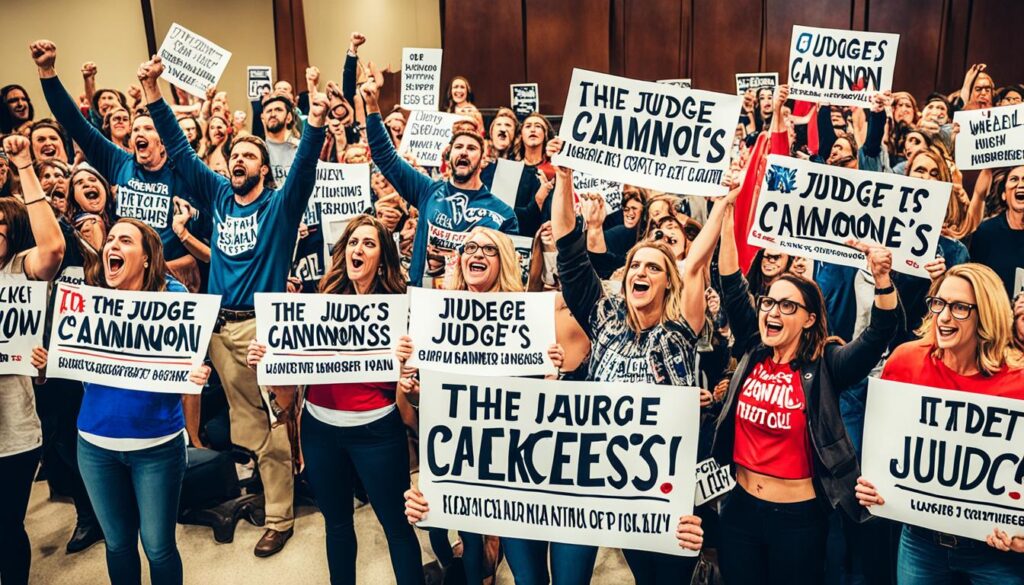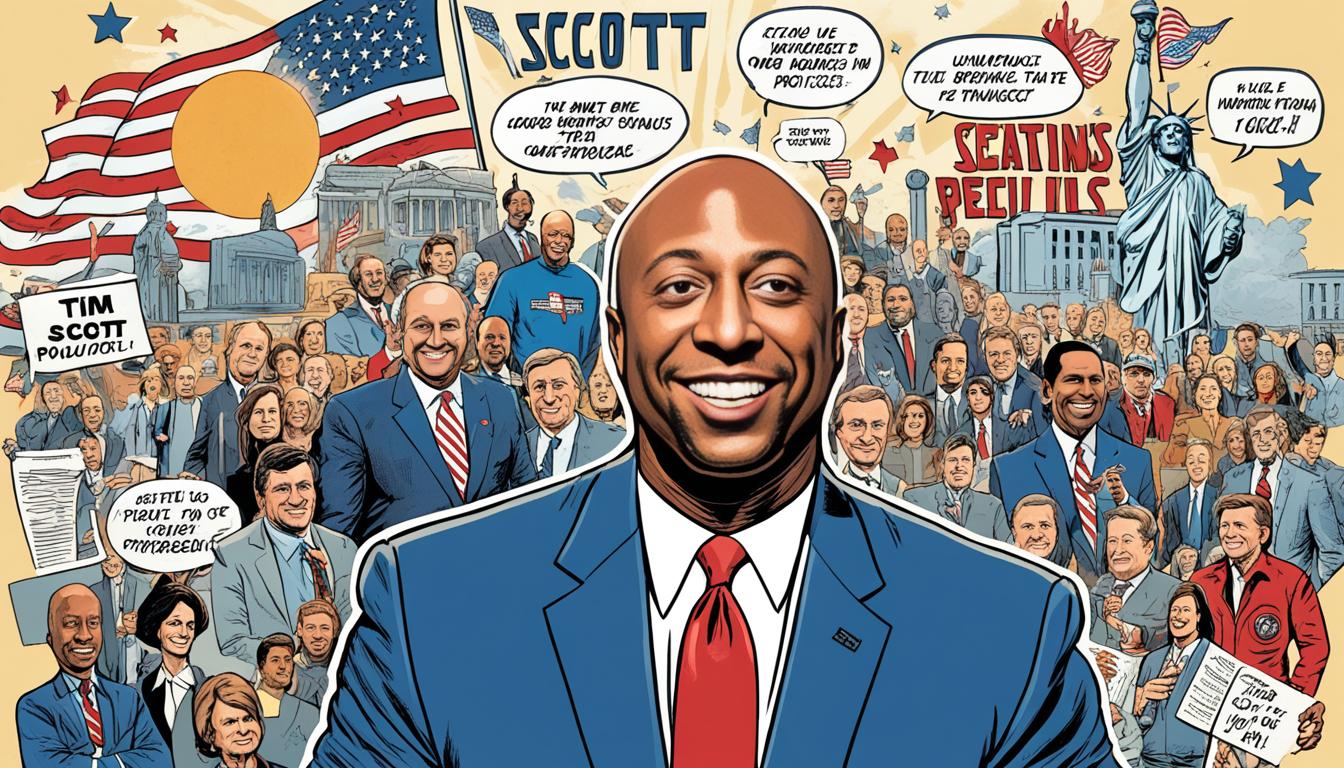U.S. District Judge Aileen M. Cannon is now a key figure in American legal arguments. Appointed by President Donald Trump in 2020, her recent decisions have caused big debates. They raise questions about the judiciary’s power.
Judge Cannon oversaw a major case against former President Trump. She made a shocking decision to dismiss it. She said the Special Counsel, Jack Smith, wasn’t properly appointed, calling him an “inferior officer.” She ignored over 150 years of tradition. This tradition supported Special Counsels in big cases, like Watergate and the Robert Mueller probe during Trump’s term1.
Legal minds are split on Judge Cannon’s work. Some cheer her for using a theory popular in conservative circles. They point to her detailed 93-page decision2. Others argue she’s ignored long-standing rules and practices. They feel this damages faith in the judiciary’s independence and honesty1.
This dismissal puts Trump’s trial on hold and worries many about its effect on elections and President Biden’s time in office2. The Supreme Court might review the case. This adds to the political drama and division triggered by Judge Cannon’s choices2.
Key Takeaways:
- Judge Aileen M. Cannon’s dismissal of criminal charges against former President Trump has ignited intense debate within the American legal landscape1.
- Her ruling questioned the statutory authority of the Special Counsel’s appointment and disregarded historical precedent1.
- The polarized reactions to Judge Cannon’s decisions highlight the divisions among legal experts and scholars1.
- The dismissal’s impact on Trump’s trial and the upcoming election has raised significant political concerns2.
- The case may eventually be reviewed by the Supreme Court, further intensifying the legal and political ramifications2.
The Bombshell Ruling: Dismissing the Strongest Criminal Case Against Trump
Judge Aileen M. Cannon made a stunning decision in the classified documents case3. She dropped all charges against former President Donald J. Trump and his co-defendants, Walt Nauta and Carlos DeOliveira3. This was the most crucial case against Mr. Trump, impacting his future in law and politics. The announcement came as Mr. Trump was named the party’s nominee at the Republican National Convention3.
In a detailed 93-page order, Judge Cannon explained why she dismissed the charges3. The case was about illegal handling of national security documents and blocking government efforts3. Special counsel Mr. Jack Smith, who brought the charges, plans to appeal the decision3.
The judge’s decision could significantly affect Mr. Trump’s future3. She discussed how special counsels like Mr. Smith are appointed, sparking debate about power separation3. She also pointed out concerns over their wide-ranging power and limited oversight, challenging their accountability3. Additionally, she noted possible Constitutional issues related to how the special counsel is funded3.
Judge Cannon’s handling of this case has been closely watched and debated among experts. It has been compared to historical investigations by independent prosecutors3. Although other federal courts have supported the legality of such actions, Judge Cannon’s methods have sparked discussions. Her unique approach has stirred debates on the case’s outcome and broader effects3.
Polarized Reactions and Political Repercussions

Judge Cannon’s ruling in Trump’s case caused sharp reactions. Democrats claim she favored politics over law. Republicans applaud her, seeing the action as overdue4. This has deepened political rifts and intensified debates about Trump’s legal troubles4. No trial will likely happen before the next election or during President Biden’s term because of the ruling. If Trump returns to power, he might use this decision to his benefit4.
| Political Reactions | Percentage |
|---|---|
| Democrats accusing Judge Cannon of political bias | — |
| Republicans praising Judge Cannon’s decision | — |
| Potential impact on upcoming election and President Biden’s term | — |
| Possible advantage for Trump if he regains power | — |
Democrat’s Accusations vs. Republican’s Praise
The dismissal by Judge Cannon split political opinions sharply. Democrats slam it, seeing bias and a neglect of law. They feel it puts politics over justice, harming rule of law45. Republicans, however, cheer the decision. They think it proves Trump was mistreated and clears his name45. This showdown shows how divided American politics has become.
Political Repercussions and Election Impact
Judge Cannon’s decision on Trump’s case has big implications. With no trial expected soon, Trump’s issues stay unresolved. He could use this to his advantage if he’s back in power. It could strengthen his image and affect future laws4. The decision also sparks more debate on Trump’s time as president and divides the nation further4. How this influences the political scene, especially with the 2024 election nearing, is key.
The Legal Roadmap and Precedent
Many legal experts have looked closely at Judge Aileen Cannon’s decision. They questioned the legal roadmap and how closely it sticks to past rulings in this big case. The decision to drop the charges against former President Donald Trump has started debates among legal minds6.
The rejection of a long practice regarding special counsels has caught a lot of attention. For more than 150 years, it’s been common to appoint special counsels, like during Watergate7. Judge Cannon’s decision challenges this tradition and raises concerns about the power of attorneys general to choose special prosecutors6.
Legal experts believe that Judge Cannon’s ruling may ignore the importance of following precedent, known as the doctrine of stare decisis. Her dismissal overlooks years of legal tradition. It might pave the way for troubling decisions in future appointments and probes6.
Judge Cannon’s decision also heavily cites Justice Clarence Thomas’s opinion. This shows how much Thomas’s legal thinking helped in dropping the case6. Citing Justice Thomas’s views shows how influential his standpoint was on this high-profile trial’s outcome76.
By using Justice Thomas’s reasons and challenging established practices, Judge Cannon’s decision has ignited debates among lawyers. They wonder about the decision’s effect on future legal directions and its consistency with established principles6.
| Key Points | References |
|---|---|
| Judge Cannon’s dismissal challenges the practice of appointing special counsels by the attorney general. | 6 |
| Her ruling challenges decades of legal precedent, raising concerns about the impact on future appointments. | 6 |
| Justice Thomas’s opinion heavily influenced Judge Cannon’s decision to dismiss the case. | 76 |
| The dismissal raises questions about the adherence to stare decisis and established legal principles. | 6 |

In conclusion, Judge Cannon’s ruling has raised questions and sparked debates. The case’s dismissal challenges historical practices and the role of special counsels, raising concerns about the legal system’s future.
The Path Forward: Appeals and Potential Reassignments
Special Counsel Jack Smith plans to challenge Judge Aileen Cannon’s decision to dismiss the case against Donald Trump8. Smith can either appeal to the U.S. Court of Appeals for the 11th Circuit or go straight to the Supreme Court. This appeal process will take months, including filing briefs and making oral arguments8.
The result of this appeal will shape the case’s future. It will show if Judge Cannon’s decision stands or gets overturned8.
There are also talks about having Judge Cannon step aside. A new judge could take over8. This change might affect the case’s direction and the final judgment8.
The appeal is a critical point in the legal battle. It will affect the role of special prosecutors and the constitutionality of their appointment98. The higher courts’ decision will set a standard for future special counsel cases.
As things unfold, experts are watching for any bias. There’s been concern about fairness due to recent court actions9. These developments complicate the public’s reaction to the case8.
Potential Appeals and Reassignments in Other High-Profile Cases
Appeals and changing judges are not new in high-stakes cases like Trump’s. Past emblematic cases, like Paul Manafort’s trial, have seen similar disputes9. These issues often highlight the struggle over the power of special counsel9.
If Jack Smith’s appeal reaches the Supreme Court, the outcome could affect many areas8. This decision could shape the future role of special counsel. It might also impact other ongoing cases against Trump8. The legal battle’s outcome could leave many questions about Trump’s accountability8.
The appeal process matters not just for Trump’s case but for the future of special prosecutors. It challenges their limits, the legality of their roles, and how officials are held accountable. As this fight continues, the next steps are uncertain but critical, adding more complexity to an already intense legal scrutiny.
| Table 1: Key Statistics on the Appeals and Potential Reassignments | |
|---|---|
| Number of Appellate Options | 2 |
| Average Duration of Appeals Process | Several months |
| Length of Judge Cannon’s Order | 93 pages |
| Number of Felony Charges in the Indictment Against Trump | Dozens |
| Reversals by the 11th Circuit | Yes |
Note: The stats here give a snapshot of the appeal process and judge changes in big cases. They help us grasp the discussion and what’s at stake.

The Impact on Trump’s Trial and the 2024 Election
The case against ex-President Donald Trump may not get a hearing before the 2024 election10. Legal battles could stretch out, delaying a final verdict10. That means it won’t be settled when people vote in the election10. Some think the case should have been brought sooner. This could have dodged delays11.
The timeline for resolving Trump’s legal issues is up in the air12. Appeals might take months, affecting the 2024 election12. This situation might rally Trump’s supporters. They could see him as unfairly targeted12. Thus, the case might sway voters, making them consider other candidates12.
The Trump documents case could change how people see things12. Some say Judge Aileen Cannon’s choice to drop the case is troubling. It might let past presidents off too easily with classified info12. Public reaction and appeals could change the story around Trump’s trial. They might affect the 2024 election in ways we can’t predict yet12.
Trump’s legal problems and their dismissal might affect the 2024 presidential race10. His campaign might gain from the case being dropped. However, others argue it harms accountability and sets a risky standard12. What happens in the next few months will shape the election’s outcome1012.

Conclusion
Judge Aileen Cannon’s decision to dismiss the case against Donald Trump has stirred the legal field. This decision13 was a big win for Trump. It put the spotlight on judges’ powers under the Constitution’s Appointments Clause13. The successful challenge of Jack Smith’s appointment13 showed how key procedural details are in court cases.
The case’s end has led to strong reactions and political fallout13. President Joe Biden wasn’t surprised by the ruling but disagreed with its basis13. The Justice Department is appealing because this ruling goes against earlier court decisions regarding a special counsel’s appointment13. Judge Cannon’s decision will deeply affect future legal battles and standards.
Judge Cannon’s 93-page ruling is rare in criminal cases and favored Trump and his co-defendants by dropping the charges14. The Justice Department plans to appeal, which could take this to the Supreme Court14. Cannon’s ruling reflects Supreme Court Justice Clarence Thomas’s doubts about appointment legality14. It also opens the floor to various groups to share their views on the issue14.










